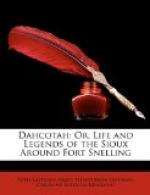The day we left Fort Snelling, I received from Mr. Pond the particulars of the fate of the Sioux woman who was taken prisoner by the Chippeways, and who is represented in the legend called The Wife. Soon after her return to her husband, he was killed by the Chippeways; and the difficulty was settled by the Chippeways paying to the Sioux what was considered the value of the murdered man, in goods, such as calico, tobacco, &c.! After his death, the widow married a Sioux, named “Scarlet Face.” They lived harmoniously for a while—but soon difficulties arose, and Scarlet Face, in a fit of savage rage, beat her to death. A most unromantic conclusion to her eventful life.
How vivid is our recollection of the grief the Sioux showed at parting with us. For although, at the time, it added to the pain naturally felt at leaving a place which had so long been our home; yet the sincere affection they evinced towards us and our children was most gratifying. They wished us to remember them, when far away, with kindness. The farewell of my friend Checkered Cloud can never be forgotten. She was my constant visitor for years; and, although a poor and despised Sioux woman, I learned to look upon her with respect and regard. Nor does my interest in her and her nation cease, because, in the chances of life, we may never meet again. It will still be my endeavor to depict all the customs, feasts and ceremonies of the Sioux, before it be too late. The account of them may be interesting, when the people who so long believed in them will be no more.
We can see they are passing away, but who can decide the interesting question of their origin? They told me that their nation had always lived in the valley of the Mississippi—that their wise men had asserted this for ages past. Some who have lived among them, think they crossed over from Persia in ships—and that they once possessed the knowledge of building large vessels, though they have now entirely lost it. This idea bears too little probability to command any confidence. The most general opinion is the often told one, that they are a remnant of God’s ancient and chosen people. Be this as it may, they are “as the setting sun, or as the autumn leaves trampled upon by powerful riders.”
They are receding rapidly, and with feeble resistance, before the giant strides of civilization. The hunting grounds of a few savages will soon become the haunts of densely peopled, civilized settlements. We should be better reconciled to this manifest destiny of the aborigines, if the inroads of civilization were worthy of it; if the last years of these, in some respects, noble people, were lit up with the hope-inspiring rays of Christianity. We are not to judge the Heathen; yet universal evidence gives the melancholy fact, that the light of nature does not lead the soul to God: and without judging of their destiny, we are bound to enlighten their minds. We know the great Being of whom they are ignorant; and well will it be for them and for us, in a day that awaits us all, if yet, though late, sadly late—yet not too late, we so give countenance and aid to the missionary, that the light of revealed truth may cheer the remaining period of their national and individual, existence.




